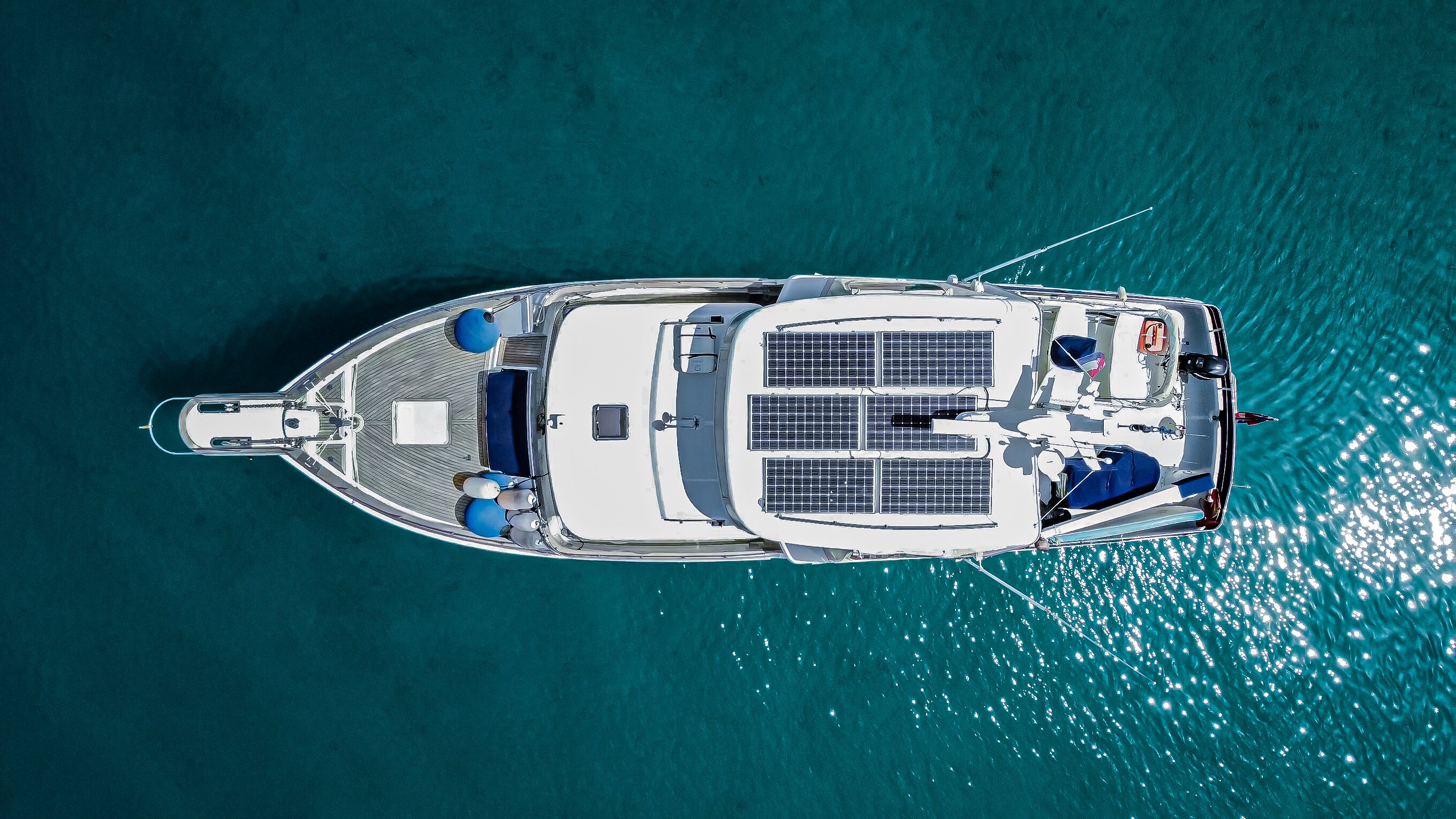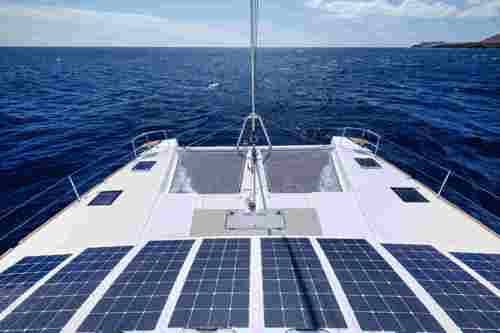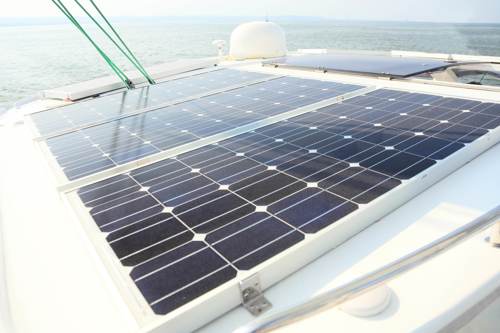Your complete guide to solar panels on yachts
21 May 2025

Whether you're considering installing solar panels on your yacht or seeking to optimise your existing setup, we're here to simplify the process and provide expert guidance. Investing in solar panels for your yacht offers substantial fuel savings and transforms your vessel into a self-sufficient, eco-friendly powerhouse. You no longer have to rely on shore power or noisy generators by utilising the sun's energy. This autonomy allows for longer periods at sea to explore remote destinations with greater freedom and peace of mind.
Regardless of your experience level – be it an experienced sailor or a newbie to yachting – integrating solar panels into your vessel offers numerous advantages. These include a quieter onboard experience, reduced maintenance needs, extended battery life and a significantly lower carbon footprint. With the declining cost of panels and advancements in solar technology, they have become a smart investment for boaters.
Before you dive into buying, read everything there is to know in our comprehensive guide. We'll walk you through how they work, the different types available, and how to calculate the power you need to install them on your yacht.

Can yachts be solar-powered?
The simple answer is yes! Land solar panels work in the same way as boat solar panels. As long as the panels have access to sunlight, the energy received will convert to your onboard solar battery as stored electricity to be used as and when required. This lets you benefit from the electricity even after the sun sets.
What is the difference between marine and land solar panels?
Marine solar panels are built to withstand the unpredictable nature of the sea, offering the same energy benefits as land-based systems but with the added advantage of being waterproof and incredibly durable.
How much does a solar yacht cost?
Although yacht solar panels seem expensive to start with, the long-term benefits far outweigh the upfront costs. Once installed, they provide a free renewable source of electricity, reducing or even eliminating the need for fuel-powered generators. You can start small with a modest setup, which allows you to experience the advantages firsthand, and over time, if and when your energy needs grow, you can easily add to your solar panel setup.
How much solar power do I need for my boat?
The first step is to work out your boat's energy requirements by adding up the watt-hours consumed by each electrical device on board (such as your fridge, computer systems, lights, etc). You may be wondering how on earth to measure this, but don't worry, there are various ways to work this out.
Most appliances display power ratings on labels or user manuals, but if you don't have access to these or are uncertain about how many hours your appliances run daily, a plug-in power meter can provide precise data. Multiply the power rating (in watts, by measuring the amps and volts) of each device by the number of hours it operates daily to obtain its daily energy consumption in watt-hours.
For example, for a 4-amp Fridge with a 12V system that runs for 12 hours a day, the calculation would look like the below:
(4A x 12V x 12 hours) = 576Wh
It's also important to consider energy lost during battery discharge, so it's advisable to include an additional 10-20%. For this example, aiming for a solar panel capacity of at least 700Wh is a wise choice to maintain a reliable energy supply.

Types of solar panels for boats
The three main types of panels for a solar-powered boat include monocrystalline, polycrystalline, and amorphous panels.
- Monocrystalline solar panels are the original and most popular panel type, made from a single pure silicon ingot. With a conversion efficiency of around 15 - 22%, monocrystalline solar panels are the best for efficiency and offer the highest electrical output per area. The trade-off is that they tend to be more expensive and require secure, permanent installation somewhere no one would walk over them.
- Polycrystalline solar panels are made from fragments of crystal silicone melted together to form a single panel piece. They perform almost as efficiently as monocrystalline cells (14%). The trade-off is that they tend to be more expensive and require secure, permanent installation to prevent damage. However, they are less expensive to produce, which makes them a slightly cheaper option.
- Amorphous solar panels are built by placing a thin slice of active silicon on a solid or flexible backing, sandwiched between rubber and polymer covers. They are the least efficient option, but they have an advantage if shade is an issue, as they lose less energy in the shade due to their bypass diodes (which provide an alternative path for current when a cell becomes shaded or faulty). They are also flexible in design, which enables them to be installed on curved surfaces and are strong enough to walk on.
So, the choice is yours. Consider your boat's unique characteristics and energy needs to select the most suitable solar panel type.
Where should I install them?
Firstly, it's important that your marine solar panels don't interfere with the vessel's operation or the movement of the crew.
Then, as a general rule of thumb, aim for areas with maximum sun exposure, minimal shade, minimal obstruction and good accessibility.
If your panels are flexible, they are strong enough to stand on. But if you intend to do this, ensure the solar panel has a non-slip coating and check that no connectors can easily be kicked out or tripped over.
If your panels are solid, consider mounting them to a movable bracket so they can be actively twisted throughout the day to receive as much sunlight as possible.
Do I need a marine solar panel regulator?
Yes – these are essential for any boat panel setup. These prevent your battery from overcharging and getting damaged, and energy from flowing the wrong way when there's no sun charging your panels. There are two types of marine solar regulators: PWM (pulse with modulation) and MPPT (maximum power point tracking). MPPT is more efficient at allowing your boat to deliver more power, and PWM regulators are easier to use/install. Plus, they are cheaper.
Solar panel maintenance
Regular maintenance will always help improve the efficiency of your solar panels. It's advised they are cleaned with distilled water (to prevent mineral stains), in the early morning when the temperatures are low and then left to air dry, or use a soft cloth to remove all water residue.

Specialist boat insurance through GJW Direct
Once you have your new solar panels installed, you may want to consider protecting your boat with specialist boat insurance.
Having specialist boat insurance in place can help protect your boat from things like accidental damage and theft, plus give you peace of mind should anything happen out on the water.
Get a quote today to see how much your cover could cost.
Please note the information provided on this page should not be taken as advice and has been written as a matter of opinion. For more on insurance cover and policy wording, see our homepage.
Got a question? Call our UK call centre 0151 473 8000
©Copyright Ripe Thinking Limited 2026. GJWDirect® is a registered trademark and a trading name of Ripe Insurance Services Limited which is Authorised and Regulated by the Financial Conduct Authority No.313411.
Registered office: One Stockport Exchange, Railway Road, Stockport, United Kingdom, SK1 3SW. Registered in England No. 04507332.
